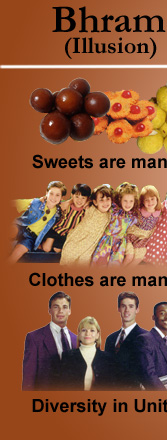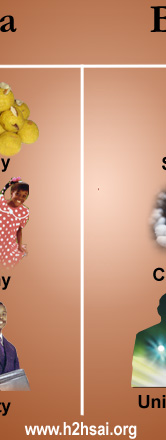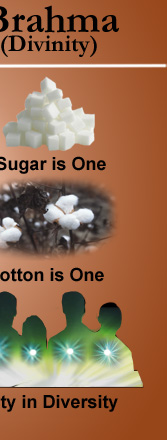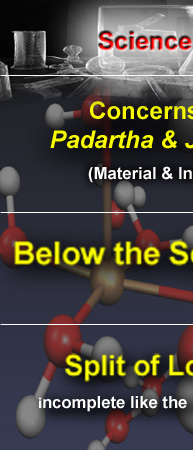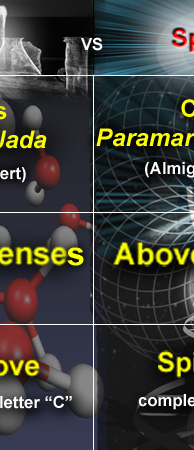CONVERSATIONS WITH SAI
Satyopanishad - Part 18:
Direct Directions from the Divine
Dear Reader,
In response to your positive feedback to this section where we have a conversation with the Divine, we continue with Prof. Anil Kumar’s ‘Satyopanishad’ following Dr. John Hislop’s series ‘Conversations with Bhagavan Sri Sathya Sai Baba’ that ended in January 2008.
This series is also in the question-answer format that many devotees prefer, and has answers from Bhagavan on topics as wide ranging as the origin of evil, the goals of human life, and aspects of God – embodied and formless, to price hikes, women’s liberation, vegetarianism, and the generation gap among people of the present times.
Published in two parts by the author, these volumes have 270 questions in all, which are neatly grouped under separate chapters. In this issue, we begin the sixth chapter, ‘Parallels and Polarities’.
Chapter 6: Parallels and Polarities
(Continued from the previous issue)
Prof. Anil Kumar: Swami! We hear two terms very often used by pandits: prakruti and purusha. Please explain these two terms?
Bhagavan: Prakruti and purusha are matter and energy. You can also take them as the positive and the negative. Even if there is bulb, you don't get light unless there is power supply. Likewise, the power supply remains useless, if there is no bulb either. Therefore, both power and light bulb are required. Similarly, this entire creation is a combination of prakruti and purusha. These two are interdependent and interrelated
Prakruti is viewed as feminine. God is the only male.
In a College for Women, girls play all the different roles in a drama. So also, at the level of the body, there are differences. But, the indweller, atma, is one and the same. The body is a bundle of bones. It is like a water bubble, it is ephemeral. It is afflicted by many diseases. After all, it is full of urine, blood, muscles, bones and faecal matter.
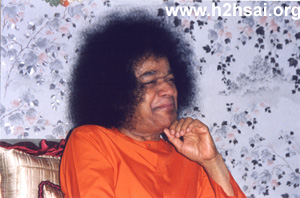 |
It emits only bad odour and not the fragrance of flowers and perfumes. The body is prakruti and undergoes change periodically. But, the eternal, changeless, immortal truth is purusha or God. It is only the purusa that is valued. Prakruti is accepted and cherished so long as purusa is there.
Sugar mixed with cream of wheat makes a sweet by name ravva laddu. Sugar in combination with dal makes a laddu. The same sugar can be mixed with any type of flour. Similarly, purusa functions through prakruti assuming different forms and names. But, purusha remains a witness, who is transcendental, beyond time and space; non-dual, eternal, blissful and is a personification of wisdom.
It is purusha, who created prakruti, the universe. Purusha is the object
while prakruti is his reflection. Therefore, these twin terms are used by Sanskrit scholars to indicate purusha and prakruti: Loka-lokeswara, viswa-visweswara, jagat-jagadiswara, sarvam-sarveswara, prapancha-parameswara, etc.
Let’s suppose there are containers made of gold, silver, copper and clay and they are filled with water. Although the containers differ in metal and value, the reflection of the Sun in all these containers is one and the same. So, the Sun is purusha while the containers represent prakruti. Matter + Energy = God.
|
Prof. Anil Kumar: Swami! Some worship Vishnu, while some others worship Siva. They don't see eye to eye with one another. There seems to be constant rivalry between these two groups, the Vaishnavites and the Saivites. Kindly tell us how these two groups of devotees of God can be united.
Bhagavan: This is utter ignorance and foolishness. The scripture says, ekamevadvitiyam Brahma which means “God is one without a second’. It also says, advaitadarshanam jnanam that is, true wisdom is non-dual. Every seeker of truth or a spiritual aspirant, should know the essential unity in diversity. You should experience unity in divinity. The worshippers of Lord Vishnu address the Lord of the seven hills of Tirupati as Venkataramana while the worshippers of Shiva call him Venkateswara. But, you know both are the same.
Once a king convened a conference of scholars of both these groups to deliberate, discuss and finally decide as to who was the greater of the two, Vishnu or Siva. Both the contending groups presented their viewpoints convincingly. The king, therefore, wanted his Chief Minister to consider all the points of the scholars and then give his verdict on the issue. The latter got up and said, “Oh King! I do not think if either of these two groups has ever experienced reality.
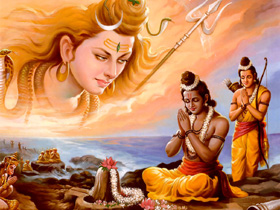 |
Those who argued in favour of Vaishnavism saying that Vishnu is greater than Siva knew little of Vishnu. Had they been genuinely devoted to Him, they would have seen Siva in Vishnu also. Similarly, those who held that Siva was superior to Vishnu would see Vishnu in Siva also".
There is another episode to illustrate this fact. One day Lord Sri Rama was passing by and on the way He saw a stone. Hanuman observed it and wanted to pick it up and throw it away. He used all his strength, but could not lift it. That very stone was the Sivalinga installed by Sri Rama in Ramesvaram, a pilgrim centre in Tamilnadu. Rama, being Vishnu Himself, proved that He and Siva are basically one and the same by installing a Sivalinga. Isn't it so? Know that all names are His and all forms are His. He is the only one who responds to our prayers.
Prof. Anil Kumar: Swami! You repeatedly mention 'love' in Your discourses. Why? Don't we have prema, love, within us? If not, how are we to develop it? What is the difference between prema, love and moha, attachment?
Bhagavan: You think you have prema, love. It is a mistake. You only have abhimana, or attachment. There is a lot of difference between the two. You have misdirected love and allowed it to flow in different ways and ultimately got it steeped in attachment. You have forgotten real prema.
The love you have towards your children is vatsalya, affection. Your love towards your wife is anuraga, attachment and your love towards worldly objects is mamakara, possessiveness. Your love towards your equals is maitri, friendship. Like this, love flows in many different directions. All this is not love in the true sense of the term. This is all physical, worldly, ever changing and temporary. This may give you prapanchika ananda, worldly pleasure, bhautik ananda, mundane pleasure, indriyananda, sensual pleasure, and manasika ananda, desire-oriented love. They give you only pleasure.
Today you may be happy with one thing and tomorrow you may not be with the same thing. In winter, you are happy wearing a woolen coat but in summer, you will be unhappy if you wear the same woolen coat. Therefore, time, position, space and states of mind bind happiness. This is the type of happiness you get out of abhimana, attachment. Dasaratha, the king of Ayodhya in the Ramayana, died of his attachment to Rama as he couldn't bear separation from him. It is again, the attachment of Kaikeyi that led to the attempt to crown Bharata and the exile of Rama.
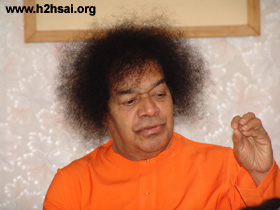 |
You observe the contrast between Rama and Dasaratha. The father, Dasaratha, due to his attachment to Kaikeyi, had to be separated from Rama by granting her the boon she had promised. But, his son, Rama, left his consort Sita to her fate in a forest, when a washerman spoke ill of her as she had spent eight long months in Lanka under the control of Ravana. What supreme detachment! He had no attachment to the kingdom either. So, he simply obeyed his father's command and left for the forest.
In the Mahabharata, you know how king Dhritarashtra remained silent due to attachment when his sons were committing atrocities against their cousins, the Pandavas, which ultimately led to the death of all his progeny. Isn't it so?
Don't you know that Yasoda couldn't fully comprehend the divinity of Krishna because she considered him always only her son and never as God, due to her vatsalya, attachment? Had Buddha been attached to his wife, Yasodhara and his son, Rahul, would it have been possible for him to leave them? Krishna, once he left Repalle, a place where he had spent his boyhood, never stepped in there again. He was not attached to the place. But, His connection with the Gopis continued, as it was only love to love relationship, which was divine. The love of the Pandavas suffered no decrease or loss in spite of the terrible sufferings they had gone through.
 |
Love is changeless. Love is steady and unshakeable. Love is non-dual. Love is not carried away by praise nor does it vanish with blame. Love is selfless and unconditional. Love is spiritual and essentially divine: it was the love of Jesus for humanity that made him pray for those who had persecuted him while he was on the cross. Isn't that the pinnacle of love?
Attachment is confined to getting and forgetting, while love always gives and forgives. Love is God. God is love. Live in love. Attachment is bondage leading to misery. Attachment is narrow and utterly selfish.
A child is full of love and bliss. As he grows up, he starts loving toys; thereafter he loves to play and slowly starts loving friends. On becoming a youth, he loves a life partner, then his family, and gradually he develops love for possessions, position and properties. Thus, love is allowed to flow in different directions, and as such, it becomes diluted and finally reduced to attachment.
Your love for God is devotion, and helps you to cultivate virtues like humility and obedience and makes your life blissful. It helps you to attain mukti, liberation. What you need today is the expansion of love.
First of all, you start with loving your family, extend your love to your relations and slowly to your community and your country as a whole, and ultimately to the entire universe. You can realise and experience God only by and through Love, as God is the embodiment of Love. You may find people in want of one thing or other. But, you find none lacking in love. You have to channelise it. Love is the natural quality which is God's gift to man.
Prof. Anil Kumar: Swami! What are Brahma, and bhrama?
Bhagavan: To realise and experience unity in diversity is 'Brahma', divinity. But, viewing one as many is 'bhrama', illusion. That which is bound by name and form is bhrama. Brahma transcends time and space, and is eternal and unsullied. You know many sweets such as gulabjamun, laddu, jelebi, basundi, etc. These sweets have their names and forms. This is bhrama. But, they are made of sugar, which is one and the same. This is Brahma.
|
Another example: You see cloth which is made of yarn closely interwoven. This is bhrama. Though the yarn is apparently different from the cloth, it is after all made of the same cotton only. This approach is Brahma. So bhrama illusion, is multiplicity, plurality, diversity and has different names and forms, while Brahma (divinity is unity), is the fundamental primordial principle.
Prof. Anil Kumar: Swami! Some say that God has no form. But, we see devotees praying to idols in temples. The concept of Avatar, the incarnation of God, is of special significance in our land of Sanatana Dharma. But followers of other paths argue that God has no form. We pray to you to clarify this point.
Bhagavan: When you see a doctor, you will be reminded of your physical complaints. When you meet a lawyer, you think of litigation and court cases, don't you? Likewise, when you see a gopuram, temple tower, you will be reminded of God. As I often say: love may not have a form, but a loving mother has. Water may not have form, but the tumbler with water has a form; air may not have a form, but the balloon into which it is pumped has a form. In the same manner, the formless divine has its form or forms. The formless expresses itself through a form.
|
A simple example: You know the screen in a theatre. You find pictures projected on the screen. In every picture, there is the screen. Without the screen, you can't see the picture. Pictures come and pass. Not even one remains permanent. This screen may be described in spiritual parlance as 'sat’ and ‘asat' or 'satasat'. ‘Sat’ is existence, ‘asat’ is non-existence. Like this, these two coexist, sakara, one with form, and nirakara, the formless.
Prof. Anil Kumar: Swami! We hear of cellular phones and remote controls everywhere. All the necessities of our worldly existence seem to be from electronics and computers, drawing the attention of everyone. How does the subject of spirituality come into the picture here? Where is the time for it? As if this is not enough, we hear of nuclear tests also. How are we to coordinate and integrate these diverse aspects? Kindly show us the way.
Bhagavan: Men are more valuable than all the wealth of the world. Having been born as human beings, you should strive to attain liberation, moksha. Science and technology can provide you many comforts and conveniences. They can't confer on you peace and bliss. What is Science? What is Spirituality? What is the difference between the two? Science is below the senses. Spirituality is above the senses. Spirituality speaks of tat, that, and Science speaks of tvam, you, so as to make you learn tattvamasi, ‘That thou art’. This is nature, world, or prakruti. That is purusha or God.
Spirituality is like the letter 'O' which is full and complete, whereas Science is like the letter 'C' which is incomplete with a hollow space within, starting at one point and ending elsewhere. Spirituality begins where Science ends and it takes you from the world to God. Spirituality makes you feel and experience divinity in this world. This is the way to integrate Science and Spirituality. Spirituality is the unseen principle behind the apparent electronic or scientific gadgets and equipment.
Prof. Anil Kumar: Swami! Are Science and Spirituality contradictory to each other? We are eager to know Swami's views on this subject.
Bhagavan: Science operates below the senses, while Spirituality functions above the senses. Science speaks of 'this', 'tvam', world, while Spirituality thinks of 'that', 'tat', divine. Science refers to tvamidam, 'near' while Spirituality concentrates on 'far', param, beyond. Science is meant for the padartha, 'material' and Spirituality is for the ultimate paramartha. Science deals with the jada, inert, and spirituality, with chaitanya, awareness. Spirituality aims at the adhara, base and Science experiments on the adheya, superstructure.
|
Science is the 'split of love' while Spirituality is the 'spirit of love'. Science deals in pravritti marga, the external world, and Spirituality in the intuitive nivrutti marga. Science can visualise the vyakta, apparent, while Spirituality dives into the avyakta, hidden. You can learn Science with your karma chaksus, physical eye, but the understanding of Spirituality needs the gyana chaksus, 'eye of wisdom'. Science is the collection of facts, which are stuffed in your 'head'. Spirituality is metaphysical, and touches your 'heart'. Science is incomplete like the letter 'C' which begins at one point and ends somewhere else. Spirituality is purnam, full like the letter 'O'.
Science supplies implements. Spirituality tells you how to use them. For example, a knife with which you can cut vegetables, fruits and so on can be used to cut throats. Science shows what you see, like your photo or picture. But, Spirituality is an x-ray film. Science is 'negative' while Spirituality is ‘positive'.
Creation is 'negative' while the creator is 'positive'. Fill your heart with positive spirituality as you fill the tank with water. Senses are the taps through which you draw the water of love. Science states facts, but Spirituality symbolises unchangeable truth, ritam.
Prof. Anil Kumar: Swami! We experience love in our worldly life. How is it different from spiritual love?
Bhagavan: Split of love is worldly, but the spirit of love is spiritual. Love shared with one's own kith and kin is the split of love. This is worldly love. The primordial principle governing the entire universe is spiritual love. This is the spirit of love. Spiritual love is universal.
Prof. Anil Kumar: Swami! Today everyone speaks of Free Will. Do we really have Free Will?
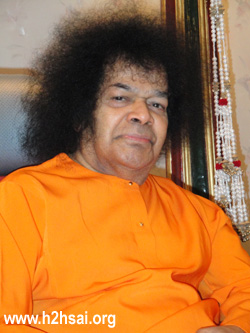 |
Bhagavan: Man has no Free Will. It is only God who has Free Will. Being a slave to the senses, how can you claim to have free will? Where from do you get Free Will? God alone is free and hence He alone has Free Will and that is why this Free Will is an absolutely divine attribute. How? Here is a small example. When a man suffers from a paralytic stroke, he is not able to lift or move the paralysed part of his body. Come on! Let him now try in the name of Free Will! So, there is no Free Will as such, and it is ridiculous to think so. There is no meaning in the claim.
Prof. Anil Kumar: Swami! In modern society, much knowledge is only half knowledge and partial understanding. We don't have a clear picture of anything. We want to know the difference between Free Will and Divine Will?
Bhagavan: It is ego and ignorance that prompt doubts of this kind. On account of body identification, you are not able to know reality. In fact, you are a slave to your senses. So, you are not free. How can you have Free Will then? God is the Master of all. He is above everything. He is not bound or limited by anybody or anything. He is absolutely free. Hence, it is only God who has Free Will or Divine Will.
Today everyone thinks that he has Free Will enabling him to do anything of his choice and that he can decide anything in the name of his Free Will. This may be one thing today and quite a different thing tomorrow, but Divine Will never changes. While exercising your Free Will, you may succeed or fail, win or lose. If you succeed, you become proud and egoistic. If you fail, you become frustrated and disappointed. But, Divine Will is a transcendental phenomenon.
What you should do is simply surrender to Divine Will. It means readiness or preparedness to receive and accept happily whatever happens in your life, good or bad, with the feeling that it is only for your ultimate good. You must accept it as God's gift to you. This is true gyana and bhakti. In fact, you do not know what is good for you. God knows the when, the why, the what, and the how, of everything, of everyone. Everything happens according to God's will or Divine Will.
If you know and sincerely believe this, you will never be elated, egoistic, proud, frustrated, depressed and disappointed once you have surrendered truly to the Divine Will.
Divine Will is present in the guise of conscience, reminding you of your responsibility. It is the antarvani, Inner Voice. But, you neglect it and don't pay heed to its appeal and message, and so you suffer. With your mind turned inward, your intellect tuned to the fundamental principle and your senses kept under strict control, you can hear clearly your Inner Voice, which is none other than the Voice of God. Divine Will is the master plan of God.
Prof. Anil Kumar: Swami! Kindly let us know the difference between devotion and surrender.
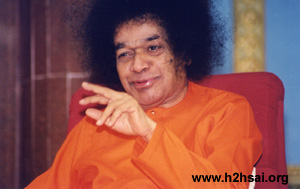 |
Bhagavan: Devotion is dual. Here is one who is devoted to God. Therefore, devotion is the path of dualism. A devotee has no meaning if there is no God. So also, God is associated with a devotee. It is devotion that links them. But, surrender is non-dual. In the path of non-dualism, we find this surrender. Once you surrender to God, you do not exist for yourself any longer. You do not have anything of your own.
For example, you have water and sugar. As it is, these two are separate and different from each other in their names, forms and tastes. This is the principle of dualism, since sugar and water exist apart from each other. Now, mix both, what happens? It is neither Sugar nor is it water. It becomes syrup. So also, the devotee who totally surrenders himself to God does not consider himself as a separate entity apart from God. This is true surrender and the spirit of non-dualism.
END OF CHAPTER 6
(To be continued...)
Dear Reader, did this article inspire you in any way? Would you like more of such conversations with the Divine? Please share with us your reflections by writing to h2h@radiosai.org mentioning your name and country. Thank you for your time.


